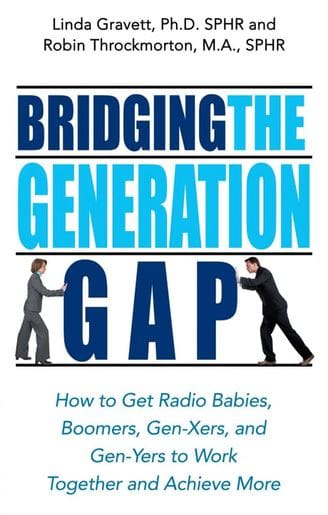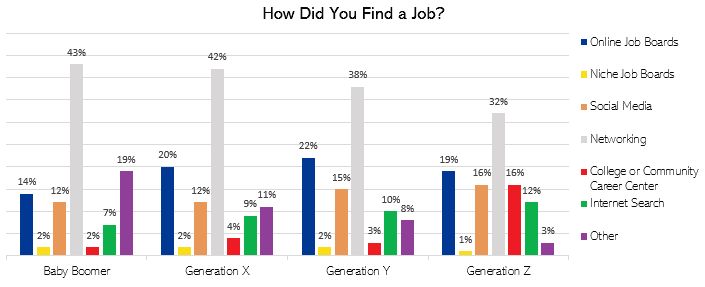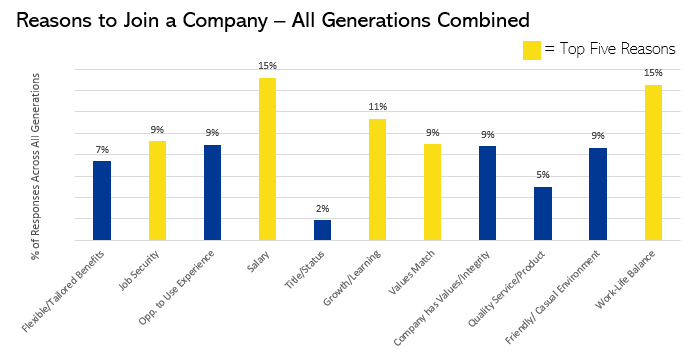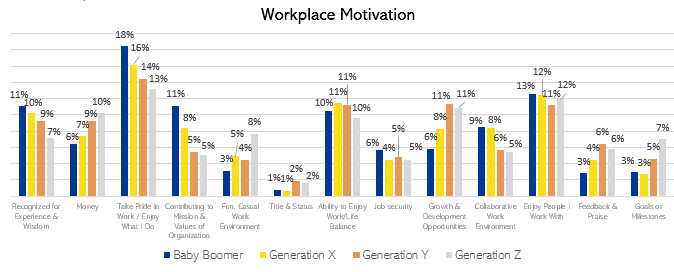The Results Are In… Here’s What Generations Want at Work!
Last Updated on March 14, 2023 / Employee Relations, HR Strategy, Recruitment

Whether you’ve been in the workforce for one year or several, you’ve most likely witnessed miscommunication and employee conflicts at work. Have you ever wondered why? What’s at the heart of these differing perspectives? Are there connections between what different generations want at work?
 Nearly fifteen years ago, Robin Throckmorton, MA, SPHR, SHRM-SCP (President and Founder, Strategic HR) and Linda Gravett, PhD, SPHR, SHRM-SCP, CEQC (Senior Partner, Gravett and Associates) set out to understand these differences in work and life perspectives. Through their research, they discovered that people’s perspectives and preferences were strongly aligned with the generation they represent. In their book, Bridging the Generation Gap, Throckmorton and Gravett shared what they learned about the five generations in the workplace.
Nearly fifteen years ago, Robin Throckmorton, MA, SPHR, SHRM-SCP (President and Founder, Strategic HR) and Linda Gravett, PhD, SPHR, SHRM-SCP, CEQC (Senior Partner, Gravett and Associates) set out to understand these differences in work and life perspectives. Through their research, they discovered that people’s perspectives and preferences were strongly aligned with the generation they represent. In their book, Bridging the Generation Gap, Throckmorton and Gravett shared what they learned about the five generations in the workplace.
Fast forward to today. Have any significant changes occurred in attitudes, behaviors, and preferences among the generations at work in the last fifteen years? That’s what our team at Strategic HR wanted to know when we launched our 2021 Survey on the Generations.
Our findings address five key areas of research:
- Formative Years & Personal Happiness
- Job Search, Workplace Preferences, & Motivation
- Remote Work Preferences
- Bothersome Characteristics of Other Generations
- What Each Generation Wants You to Know
In this Emerging Issues in HR, we’ll reveal some of our key survey findings of each generation’s perspectives on Job Search, Workplace Preferences, and Motivation. We’ll also provide recommendations on how employers can use these findings to ensure that their organizations are well-positioned to attract and retain a multigenerational workforce. To learn more, download our Generations at Work Insights.
Generations Represented in our Survey
- Radio Babies (born 1930-1945)
- Baby Boomers (born 1946-1964)
- Generation X (born 1965-1976)
- Generation Y: First Wave of Millennials (born 1977-1990)
- Generation Z: Second Wave of Millennials (born 1991-2001)
Preferred Job Search Tools
When asked about the avenues used to pursue a new job, roughly 32-43% of all respondents across generations indicated that networking was their primary resource. The younger the generation, the less reliant upon networking they became (only 32% of Generation Z utilized networking).
In line with our increasingly digital world, online job boards and social media emerged as the second and third choices (respectively) for Generations X, Y, and Z while Baby Boomers chose “other” and online job boards as their next go-to job search options.

Key Takeaways for Talent Acquisition:
- Networking is more important than ever. Employee referral programs can serve as a key pipeline for potential talent, particularly when motivated by referral bonuses.
- Make your job ads accessible online – post them on social media, online job boards, and your website’s careers page. Encourage your employees to share your jobs with their networks.
- Before you pay a high price for niche job boards, research their hiring success rates.
Reasons to Join a Company
Once a job seeker finds a role that may be a fit, what convinces them to join the company? When reviewing the responses from all generations in total, the three top reasons to join a company were: 1) Salary; 2) Ability to enjoy work-life balance; and 3) Growth and learning opportunities.

Key Takeaways for Talent Acquisition:
- Organizations looking to hire for any position need to have a competitive salary and provide the ability to enjoy work/life balance to attract talent across the generations. This may look like offering hybrid or completely remote work models and flexible hours.
- Since Baby Boomers highly value the opportunity to use their experience while Generations X, Y, and Z value learning, consider leveraging your Baby Boomers to share their experience with others. Consider hosting lunch and learns, professional development/training, or mentoring opportunities that allow knowledge and experience to be shared across generations.
Workplace Preferences & Motivation
Even the best talent can deliver poor performance if not motivated appropriately, and it’s not a secret that what may work for one person won’t work for another. Or is it? Our survey found:

- Top two motivators across generations were 1) “Taking pride in their work” and enjoying what they do, and 2) They “enjoy the people they work with.”
- Generation Z had the most focus on money (10%) in comparison to other generations, as others have had more opportunities to build wealth over time.
- Ability to enjoy work-life balance was high on the list for Generations X and Y (over 11% for each generation).
- Generations Y and Z placed a greater emphasis on growth and learning opportunities (11 % for both generations).
- Baby Boomers were the generation most motivated by the concept of contributing to the mission and values of an organization (11% in comparison to 9% and lower among other generations).
- At 10% and 11% respectively, Gen X and Baby Boomers ranked “being recognized for their experience and wisdom” higher than Gen Y (9%) and Gen Z (7%).
What the Generations Want in an Ideal Boss
 The “ideal boss” can look different to each and every employee — some prefer bosses who are hands-off, while others enjoy a deeply collaborative and engaged approach from their manager. No matter the approach, all the generations surveyed ranked the same two qualities as their most important characteristics of a boss — trust and support.
The “ideal boss” can look different to each and every employee — some prefer bosses who are hands-off, while others enjoy a deeply collaborative and engaged approach from their manager. No matter the approach, all the generations surveyed ranked the same two qualities as their most important characteristics of a boss — trust and support.
When further considering the qualities they prioritize most in a boss, Generations X, Y, and Z preferred good communication in an ideal boss, followed by competence. In comparison, Baby Boomers looked for competency first, followed closely by a desire for respect. This may be due to Baby Boomers’ tenure in the field, and the desire for recognition of their experience and expertise.
Top Reasons to Stay at a Company
One of the key challenges facing employers today, outside of attracting the right talent, is retaining their employees. Luckily for employers, all generations surveyed were able to agree on at least two factors among their top three reasons to stay at a company – the “ability to enjoy work-life balance” and to “enjoy the people I work with.”
Additional factors ranking as “Top Reasons to Stay” included Compensation; Work continues to be interesting; Experience/Expertise is respected; and Company has integrity.
Key Takeaways to Retain a Multigenerational Workforce:
Achieving Work/Life Balance
Knowing what employees across all generations value the most provides a starting point to review your current retention strategies. Ask yourself: How do your current company policies and common practices align with and support the value of work/life balance? Do you offer a level of flexibility that allows for the work/life balance that employees are seeking? If not, this is a critical area to address that can lead to improved recruitment and retention.
Attracting and Retaining Great Colleagues
Enjoying the people they work with is another value shared across all generations. One way to address this can be to use assessment tools in your talent acquisition process to understand a candidate’s typical work behaviors, values, and preferences to determine how they align with your company’s core values and needs of the team they would be joining. Consider including team members in your recruiting process to allow both the team members and potential new hires to discuss core company/team values, assess potential fit, and explore opportunities to learn and grow from one another.
Ensuring Competitive Compensation
It’s no surprise that compensation ranked among the top reasons to stay at a company. People want to be compensated fairly, and if they are not, it gives them good reason to look elsewhere. How competitive are your compensation and benefits in today’s market? If you’re not sure, you may want to conduct a Salary and Benefits Benchmark Review. If your comp and benefits are competitive but your employees aren’t armed with this information, you should consider providing Total Compensation Statements that showcase the full value of what your organization offers to them.
Employee Relations, Team Development, and Company Culture
Many of the top reasons that employees choose to stay with a company have implications for employee relations, team development, and nurturing of your company culture. If your organization is struggling with employee retention, these are additional areas to review and improve. Consider using stay interviews, focus groups, and employee surveys to get to the heart of your employees’ needs, concerns, and goals.
Be on the lookout for “What Generations Want at Work– Part 2”, coming out in early 2022!
The team at Strategic HR would like to thank all of the participants who shared their honest thoughts, feedback, and experiences with us over the course of this survey.




